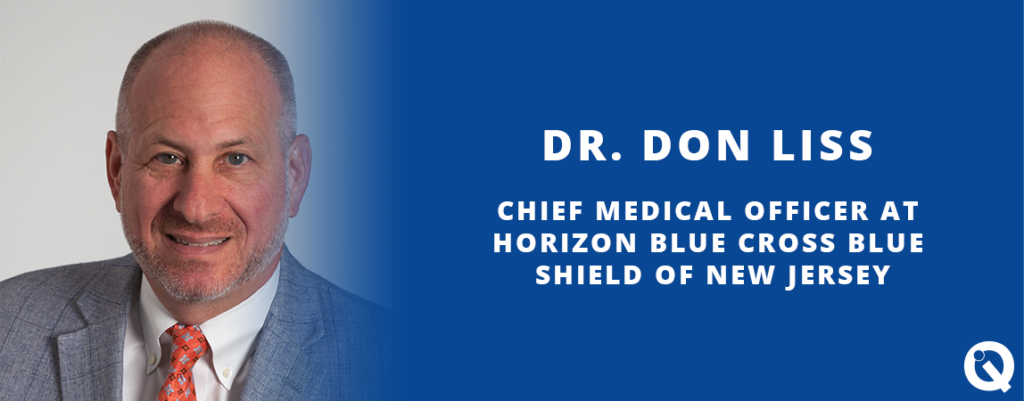Don Liss, M.D., is Vice President and Chief Medical Officer at Horizon Blue Cross Blue Shield of New Jersey, a member of the Quality Institute’s Leadership Council. In this interview, he talks about the challenges of providing high quality health care that’s still affordable.
You recently returned to New Jersey. Can you tell us what you see as the greatest challenges in health care since you were last focused on this region?
Without a doubt, the biggest challenge that we face in the health care arena is affordability. Challenges exist at almost every level … for individuals and families, for businesses, and for governmental entities. They struggle mightily with making sure that the people they care about get the best health care they can — and in a way that remains affordable. And the challenges of affordability are becoming greater. Advances in medical science are happening every day — some emerging right here in New Jersey, others elsewhere — but they can be incredibly costly. And the challenge is to figure out how we bring the right care to the right patients in the right setting, and make sure services are delivered in a safe, responsible and affordable way.
At the Quality Institute, we’re focused on improving health care quality. What are some of your quality priorities for Horizon and the providers you contract and engage with to serve your members?
In every one of the arrangements we strike with our OMNIA Alliance and value-based partners, we establish clear quality goals. We establish goals for improving preventive services; improving cancer-screening services; improving the compliance with evidence-based treatments for chronic conditions. And we take that obligation very seriously. We provide feedback to health systems, physician practices — especially primary care practices — on a regular basis. We embed our staff in offices and collaborate in other ways with physicians and other practitioners to help them implement best practices supported by medical evidence. We convene providers from across the state to compare notes with one another — and look for best practices among themselves so that our members, and, frankly, all the residents of New Jersey, can experience better healthcare.
We are in a time of health care transformation. Can you tell us what innovations you think will do the most to make sure that people get the right care, at the right time, in the right setting?
There are lots of ways to answer that question. Advances in information technology and medical science are bringing all kinds of new opportunities to health care. And perhaps the challenge is balancing human interaction with these advances to make sure that folks are getting the care they need and deserve — and that they’re getting care in a way that’s patient-centric, that’s human, that demonstrates the fundamentals of care that we should expect from a system intended to deliver health care.
More specifically, there are advances in telemedicine and telehealth, and we need to figure out how to use these technologies to deliver care in a way that’s humanistic, in a way that respects people and the interactions that health care professionals have with their patients. We need to leverage the kinds of advances we’ve seen in other industries, and make them applicable to medicine and health care. Smart phone advances are another example. Horizon has been building new features and functions into the app that it offers to its members and our goal is to continue down this path to help members navigate the health care system effectively, add more convenience and improve the health care experience.
What do you see as the biggest challenges to addressing access, cost, and safety?
Again, one theme that probably applies to all three of those domains is preparing the community to become better consumers of heath care. Now, that’s obviously been going on for some time. But with improvements in access to clinical information and the information that consumers can get from all kinds of sources, hopefully more reputable sources, they’re going to be different than the prior generations in how they access health care. They’re going to hopefully ask better questions. They’re going to engage in shared decision making with their physicians and other health care providers more intelligently. They’re going to self-direct to certain kinds of health care more than their parents might have. And we’ve got to think about all those things as we look to the future in how health care gets delivered. We’ve also seen incredible consolidation in the hospital community, and we’ve got to figure out how to leverage that scale and scope to deliver better care.
We like to give people a sense of who you are outside of your work life and role at Horizon. Can you tell us where we might find you on a day away from the office?
You’ll find me in my Eagles jersey, tailgating in the parking lot at Lincoln Financial Field, cheering rabidly for the Birds. Or you’ll find me riding my bike, often along Route 29. And you may find me fixing various appliances, maybe plumbing and electrical components, at the homes of my children. And you’ll find me listening to my wife — a primary care physician who my kids remind me is “the real doctor” – who keeps me grounded in appreciating the challenges in delivering care to her patients.

